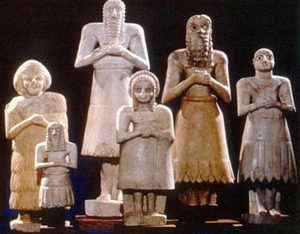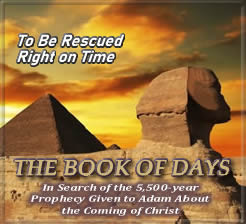Fire and Blade (Cont’d)
The Homecoming
With another plate of succulent meat, Abram returned to his father’s chamber of idols. He approached them and placed the offering in front of the largest one there. Again he sat and watched all day. Still, none of them reached out to eat a thing. Abram sprang to his feet and began to anxiously pace back and forth, growing more agitated by the moment. Lifting his eyes toward Heaven, he cried out, “Lord of Heaven and Earth, please tell me: What should I do?”
Suddenly an eerie wind blew into the room, gusting through his hair and into his nostrils. Inspired by the whirlwind, Abram shouted above the din, “My father and this wicked generation are all doomed! They serve idols with mouths that can’t speak. They have eyes and ears and hands, but still they’re completely useless, just like the people who made them!” As if seized with a tremendous insight, Abram’s eyes began to gleam with a curious shimmer. Grabbing a hatchet, he started hacking away at his father’s idols.
Hearing the sound of the hatchet from outside his home, Terah ran inside to see what was happening. As Terah was heading for his chamber of idols, he passed Abram casually walking down the hall in the other direction. And when Terah went into the room, to his absolute horror, he found that all of his idols had been smashed to pieces; all except one, that is. Much to his chagrin, this remaining idol was standing there with a plate of food in front of it, and stranger still, this idol was holding Abram’s hatchet in its hand. A stunned Terah ran into the living room, where he found Abram, lounging with his brother, Nahor.
“Abram, by the gods,” blurted Terah, “what have you done?”
“What’s wrong, Father?”
Wringing his hands in abject frustration, Terah then pointed down the hallway toward his chamber of idols. “M—my gods, someone’s destroyed them! Didn’t I see you coming from their room just now? You did this thing, didn’t you?”
“You say they’ve all been destroyed?”
“All but one, yes. They’re completely smashed. Tell me, son, before I lose my temper. Why’d you do it?”
“But I have no idea what you’re talking about, Father,” replied Abram, as calm as can be. “I only brought them a meat offering in your honor. But when I came closer, they all tried to grab the food before the biggest god had a chance to eat any of it.”
“Nonsense.”
“No, Father, really. Didn’t you say they’d all been destroyed except one?”
“Yes, you know I just told you that.”
“Well, there you are. It’s just like I told you, really. You should’ve seen it. The biggest god was so angry he became violent. He took a hatchet and smashed them all before I had a chance to stop him. As I recall, he’s still got the thing in his hand. Check for yourself, if you don’t believe me.”
Story Continues Below
Says Richard Price—the founder and CEO of Academia.edu—on his podcast In Depth With Academia:
Tales of Forever: The Unfolding Drama of God’s Hidden Hand in History is:
To hear Price’s book review of Tales of Forever, CLICK HERE.
To hear Kent and Zen Garcia continue their discussion concerning the implications of the 5,500-year chronology from Adam to Christ as it pertains to the faithfulness of God, CLICK BELOW.
Story Continues From Above
“Never mind that now, Abram.” His father’s frustration abruptly turned to anger. “You’re lying! You’re nothing but a filthy liar!”
“No, Father,” said Abram in bitter earnest, looking his father right in the eye. “That’s where you’re clearly mistaken. Tell him, Nahor. Tell him his son is no liar.”
But Terah was too angry to wait for Nahor’s response. “You actually expect me to believe these gods have the power to do what you’ve just described? What kind of a fool do you take me for?”
“What are you saying, then? You mean your gods aren’t capable of such a thing?”
“Of course not. How could they? They’re just wood and stone. I should know; Haran and I made them ourselves.”
Astonished, Abram gaped at his father. “Then, for Heaven’s sake, why do you worship them?”
“Because, well, because…” Terah blanched, momentarily taken aback. “Because that’s what we’ve always done, why else?”
“Do they hear your prayers?”
“H—how should I know?”
“Will they fight any of your battles? Can they rescue you from your enemies?”
”Of course not.” Terah obstinately crossed his arms. “Please, son, now you’re just being ridiculous.”
“You know, Father, I’m sure this can’t be good for you or my brothers. Only a fool would serve an idol, or worse, a rebel against God.”
“Enough already! You’re overreacting, son. There’s no way that God could be that concerned about how we choose to live.”
“But that’s just it; He does care. Don’t you remember? Our forefathers sinned like this in the past, and the Lord wiped them out with the Flood!”
Terah defiantly shook his head. “Oh, Abram, that was then; this is now. The Lord would never do something like that again, not to us.”
“I don’t know, Father. Are you really so eager to find out? You actually want to risk inciting the anger of God, just so you can worship a bunch of useless idols?”
“Abram, please. I still say you’re overreacting to this whole thing.”
“For God’s sake, Father, put an end to this madness right now, before it’s too late! You don’t want to bring disaster to your own family, do you?”
Abram then sprang to his feet and started back toward the chamber of idols.
“Abram, son, where do you think you’re going?” Turning to his other son, he pleaded, “Nahor, don’t just sit there; do something! Your brother’s gone insane!”
“Me? What do you expect me to do about it? He’s your son.”
“Abram, wait!” Bolting down the hall, Terah ran through the doorway just in time to see his son approaching his one remaining idol. “Son, I forbid you to come in here anymore!”
“I’m sorry, Father, really I am; but all this has to end, so help me God.”
Abram strode to the idol, took the hatchet from its hand, and raised it, ready to strike.
“No, son!” screeched Terah. “Don’t!”
And after hacking Terah’s last idol into so many bits of firewood, Abram ran out of the room, leaving his father just standing there, stunned and speechless.







